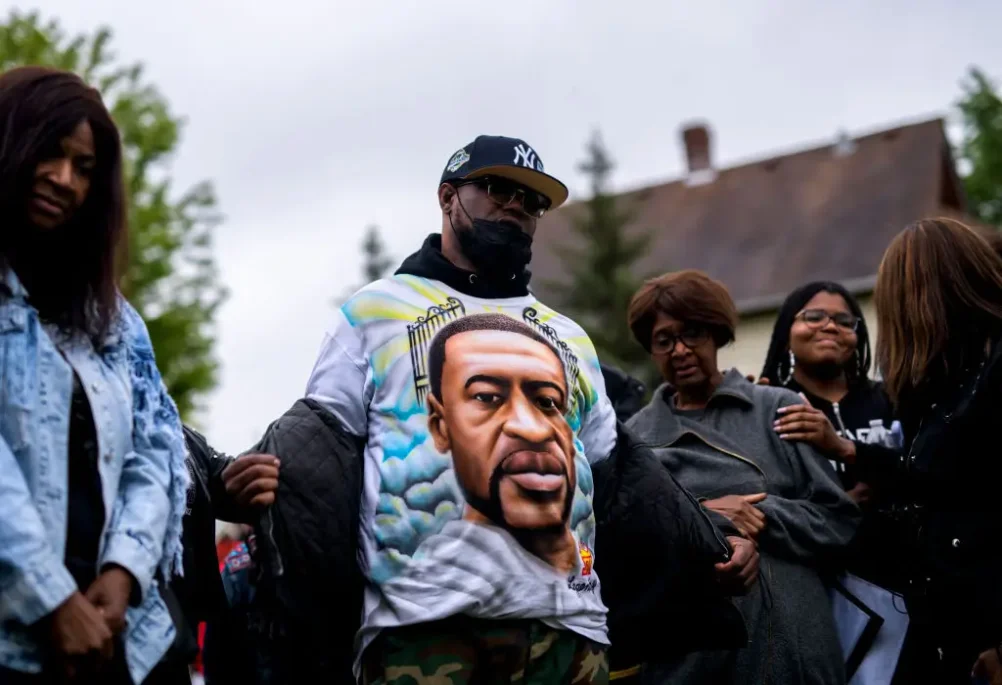Minnesota Lawmakers Failed to Ban Police from Using ‘Excited Delirium,’ Keeping Racist Excuse Used to Justify Killing People In Custody Alive
For the past several decades, police in the United States have justified killing citizens in the line of duty by attributing the deaths to a condition called “excited delirium” — even though several medical associations have described the diagnosis as pseudoscience and racist.
Prosecutors even tried using that excuse to justify the death of George Floyd in 2020, who died in a viral video after Minneapolis police officer Derek Chauvin planted his knee on his neck for almost nine minutes.
However, a recent effort by lawmakers to ban law enforcement officers from using the term to justify the use of force and from receiving training in the controversial condition has failed. If the measure had passed, Minnesota would have become the third state in the country to bar the term that has been described by the American Medical Association as “a manifestation of systemic racism.”
The bill was introduced by Minnesota state Rep. Jessica Hanson, who described excited delirium as “rooted in anti-Black racism,” according to the Minnesota Star-Tribune.
The bill was introduced in February, and both chambers negotiated final language in the last weeks of the session, but according to reports, it ended on May 20.
Last year, California became the first state to ban its use, and last month, Colorado became the second state to do so. More states are expected to follow suit as more of these incidents are caught on video.
History of Excited Delirium
The term was first used in South Florida during the early 1980s when Dr. Charles Wetli, deputy medical examiner for Miami-Dade County, began using it to describe the deaths of 19 Black women who were prostitutes after he found traces of cocaine in their system, according to a research summary accompanying the bill.
But even after it was later determined the women were killed by a serial killer, Dr. Wetli continued to use the term to justify the deaths of six Black men and one Black woman who died in police custody after being hog-tied or placed in a hobble restraint in a prone position.
He even argued the deaths may be tied to genetics rather than police abuse, according to the research summary.
Since then, countless law enforcement agencies across the nation have used that term to justify killing people with little resistance from medical experts.
In 2009, the American College of Emergency Physicians was the first medical organization to recognize excited delirium as “a real syndrome of uncertain etiology.” But a 2017 investigation by Reuters determined that three members of the 19-member board that came to that conclusion were paid consultants from Axon, the company that manufactures Tasers, which were used in numerous of these deaths.
It was only after the 2020 George Floyd video shocked the world that medical professionals seriously scrutinized the term.
“The term has come to be used as a catch-all for deaths occurring in the context of law enforcement restraint … and disproportionately used to explain the deaths of young Black men in police encounters,” according to a 2022 study by Physicians for Human Rights.
California
In October 2023, California Gov. Gavin Newsom signed the bill into law that was inspired by the death of Angelo Quinto in 2020, a 30-year-old Filipino-American Navy veteran who died while handcuffed and lying on his stomach.
Quinto’s family had called Antioch, California, police for help because he was suffering a mental episode. But they said police planted their knees on his back for five minutes, which led to his death, reports show.
The Contra Costa County coroner conducted an autopsy and determined he had died of excited delirium because he had Modafinil in his system, which is used to treat narcolepsy.
But an autopsy ordered by Quinto’s family determined he had died of asphyxiation, according to NBC Bay Area.
The four Antioch police officers were cleared by the Contra Costa District Attorney’s Office, but a lawsuit against the cops filed by the family remains pending, according to Courthouse News.
Colorado
Colorado Gov. Jared Polis signed his state’s bill into law in April, which states the following:
“A peace officer is prohibited from using the term ‘excited delirium’ to describe a person in an incident report. A coroner or other person authorized to determine a cause of death shall not register ‘excited delirium’ as the cause of death on a death certificate.”
One of the cases that inspired the Colorado law was the 2019 death of Elijah McClain, a 23-year-old unarmed Black man killed while walking home after he was confronted by three Aurora police officers who determined he looked “suspicious.”
Although the Adams County Coroner concluded the case of McClain’s death to be “undetermined,” the coroner speculated it could have been a result of excited delirium even though no stimulants were found in McClain’s body.
Three years later, the coroner’s office amended its autopsy to state that McClain’s death was a result of “complications of ketamine administration following forcible restraint.”
The incident eventually led to the arrest of three Aurora police officers and two paramedics who were responsible for administrating the injection of 500 mg of ketamine as a sedative to excited delirium, a dose more suitable for a 220-pound man than for the 140-pound McClain.
Aurora police officer Randy Roema was the only cop convicted and sentenced to 14 months in the Adams County Jail on charges of criminal negligent homicide and third-degree assault. He is appealing the conviction.
The two Aurora paramedics, Jeremy Cooper and Peter Cichuniec, were convicted of criminal negligent homicide. Cooper, who administered the injection, was sentenced to five years in prison, while Cichuniec was sentenced to probation.

